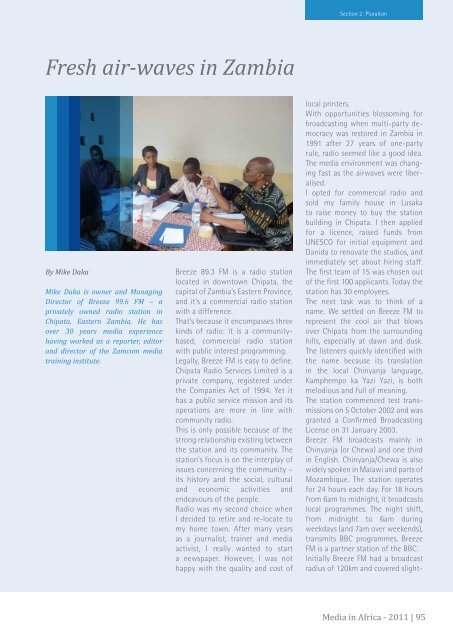Twenty years after the Windhoek Declaration on press freedom
Twenty years after the Windhoek Declaration on press freedom
Twenty years after the Windhoek Declaration on press freedom
You also want an ePaper? Increase the reach of your titles
YUMPU automatically turns print PDFs into web optimized ePapers that Google loves.
Fresh air-waves in Zambia<br />
By Mike Daka<br />
Mike Daka is owner and Managing<br />
Director of Breeze 99.6 FM – a<br />
privately owned radio stati<strong>on</strong> in<br />
Chipata, Eastern Zambia. He has<br />
over 30 <str<strong>on</strong>g>years</str<strong>on</strong>g> media experience<br />
having worked as a reporter, editor<br />
and director of <str<strong>on</strong>g>the</str<strong>on</strong>g> Zamcom media<br />
training institute.<br />
Breeze 89.3 FM is a radio stati<strong>on</strong><br />
located in downtown Chipata, <str<strong>on</strong>g>the</str<strong>on</strong>g><br />
capital of Zambia’s Eastern Province,<br />
and it’s a commercial radio stati<strong>on</strong><br />
with a difference.<br />
That’s because it encompasses three<br />
kinds of radio: it is a communitybased,<br />
commercial radio stati<strong>on</strong><br />
with public interest programming.<br />
Legally, Breeze FM is easy to define.<br />
Chipata Radio Services Limited is a<br />
private company, registered under<br />
<str<strong>on</strong>g>the</str<strong>on</strong>g> Companies Act of 1994. Yet it<br />
has a public service missi<strong>on</strong> and its<br />
operati<strong>on</strong>s are more in line with<br />
community radio.<br />
This is <strong>on</strong>ly possible because of <str<strong>on</strong>g>the</str<strong>on</strong>g><br />
str<strong>on</strong>g relati<strong>on</strong>ship existing between<br />
<str<strong>on</strong>g>the</str<strong>on</strong>g> stati<strong>on</strong> and its community. The<br />
stati<strong>on</strong>’s focus is <strong>on</strong> <str<strong>on</strong>g>the</str<strong>on</strong>g> interplay of<br />
issues c<strong>on</strong>cerning <str<strong>on</strong>g>the</str<strong>on</strong>g> community –<br />
its history and <str<strong>on</strong>g>the</str<strong>on</strong>g> social, cultural<br />
and ec<strong>on</strong>omic activities and<br />
endeavours of <str<strong>on</strong>g>the</str<strong>on</strong>g> people.<br />
Radio was my sec<strong>on</strong>d choice when<br />
I decided to retire and re-locate to<br />
my home town. After many <str<strong>on</strong>g>years</str<strong>on</strong>g><br />
as a journalist, trainer and media<br />
activist, I really wanted to start<br />
a newspaper. However, I was not<br />
happy with <str<strong>on</strong>g>the</str<strong>on</strong>g> quality and cost of<br />
Secti<strong>on</strong> 2: Pluralism<br />
local printers.<br />
With opportunities blossoming for<br />
broadcasting when multi-party democracy<br />
was restored in Zambia in<br />
1991 <str<strong>on</strong>g>after</str<strong>on</strong>g> 27 <str<strong>on</strong>g>years</str<strong>on</strong>g> of <strong>on</strong>e-party<br />
rule, radio seemed like a good idea.<br />
The media envir<strong>on</strong>ment was changing<br />
fast as <str<strong>on</strong>g>the</str<strong>on</strong>g> airwaves were liberalised.<br />
I opted for commercial radio and<br />
sold my family house in Lusaka<br />
to raise m<strong>on</strong>ey to buy <str<strong>on</strong>g>the</str<strong>on</strong>g> stati<strong>on</strong><br />
building in Chipata. I <str<strong>on</strong>g>the</str<strong>on</strong>g>n applied<br />
for a licence, raised funds from<br />
UNESCO for initial equipment and<br />
Danida to renovate <str<strong>on</strong>g>the</str<strong>on</strong>g> studios, and<br />
immediately set about hiring staff.<br />
The first team of 15 was chosen out<br />
of <str<strong>on</strong>g>the</str<strong>on</strong>g> first 100 applicants. Today <str<strong>on</strong>g>the</str<strong>on</strong>g><br />
stati<strong>on</strong> has 30 employees.<br />
The next task was to think of a<br />
name. We settled <strong>on</strong> Breeze FM to<br />
represent <str<strong>on</strong>g>the</str<strong>on</strong>g> cool air that blows<br />
over Chipata from <str<strong>on</strong>g>the</str<strong>on</strong>g> surrounding<br />
hills, especially at dawn and dusk.<br />
The listeners quickly identified with<br />
<str<strong>on</strong>g>the</str<strong>on</strong>g> name because its translati<strong>on</strong><br />
in <str<strong>on</strong>g>the</str<strong>on</strong>g> local Chinyanja language,<br />
Kamphempo ka Yazi Yazi, is both<br />
melodious and full of meaning.<br />
The stati<strong>on</strong> commenced test transmissi<strong>on</strong>s<br />
<strong>on</strong> 5 October 2002 and was<br />
granted a C<strong>on</strong>firmed Broadcasting<br />
License <strong>on</strong> 31 January 2003.<br />
Breeze FM broadcasts mainly in<br />
Chinyanja (or Chewa) and <strong>on</strong>e third<br />
in English. Chinyanja/Chewa is also<br />
widely spoken in Malawi and parts of<br />
Mozambique. The stati<strong>on</strong> operates<br />
for 24 hours each day. For 18 hours<br />
from 6am to midnight, it broadcasts<br />
local programmes. The night shift,<br />
from midnight to 6am during<br />
weekdays (and 7am over weekends),<br />
transmits BBC programmes. Breeze<br />
FM is a partner stati<strong>on</strong> of <str<strong>on</strong>g>the</str<strong>on</strong>g> BBC.<br />
Initially Breeze FM had a broadcast<br />
radius of 120km and covered slight-<br />
Media in Africa - 2011 | 95












